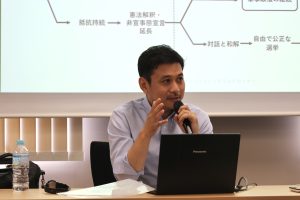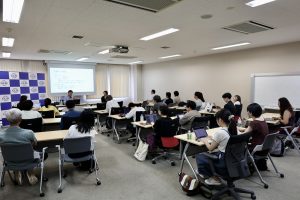On July 21, 2023, the Institute for Global Governance Research (GGR) hosted a GGR Talk Session titled “Stalemate in Post-coup Myanmar Politics” featuring Dr. Yoshihiro Nakanishi (Associate Professor at Center for Southeast Asian Studies, Kyoto University).
In this talk session, Prof. Nakanishi explained the timeline of the military coup carried out by the Myanmar military in February 2021, the details of various crises resulting from it and the reasons behind their indeterminate resolution, as well as the prospective outlook on the Myanmar crisis.
Firstly, regarding the background of the 2021 coup, Prof. Nakanishi cited the landslide victory of the National League for Democracy (NLD) in the 2020 general elections, the military’s allegations of election fraud against the NLD, and the failed negotiations between the military and the NLD concerning investigations into election irregularities. Furthermore, the coup was attributed to differences in national perspectives between the military and democratic forces, the reduction of military interests as democratization progressed, and the ambitions of Senior General Min Aung Hlaing, the Commander-in-Chief of the Myanmar military. Prof. Nakanishi went on to explain that while the military suppressed anti-coup movements such as street protests, citizens and pro-democracy elements formed resistance factions, resulting in frequent conflicts within Myanmar and leading to a significant number of internally displaced people. In relation to the Myanmar crisis, it was noted that neither the military nor the resistance forces could claim complete victory in the conflict, the international community exhibited a lack of cohesive response, and the effectiveness of United Nations activities remained limited, hence the absence of a clear resolution. Concluding with future prospects, Prof. Nakanishi presented three scenarios: 1) the emergence of a pro-military government through elections under military management, 2) the continuation of the military regime, and 3) reconciliation between the military and resistance forces, followed by the equitable distribution of power through free and fair elections. The current reality, however, makes scenarios 1 and 3 unrealistic, according to Prof. Nakanishi.
During the Q&A session, questions arose about the reasons why a coup did not occur in 2015 despite the NLD’s landslide victory in the 2015 general elections, the potential for dialogue and compromise between the military and resistance forces, and the background of the military regime’s rise in Myanmar. At the end of the session, Prof. Nakanishi expressed concern over the limited global interest in the Myanmar crisis, emphasizing that discussions have primarily concluded at an ideological level by labeling the military as “bad,” without thorough examination of the conflict’s realities and the effectiveness of sanctions. It was noted that discussions should encompass not only the desire for “justice” by holding the military accountable but also consideration of compromise with the military.
【Event report prepared by】
Tomohito NAKANO (Master’s student, School of International and Public Policy, Hitotsubashi University)


